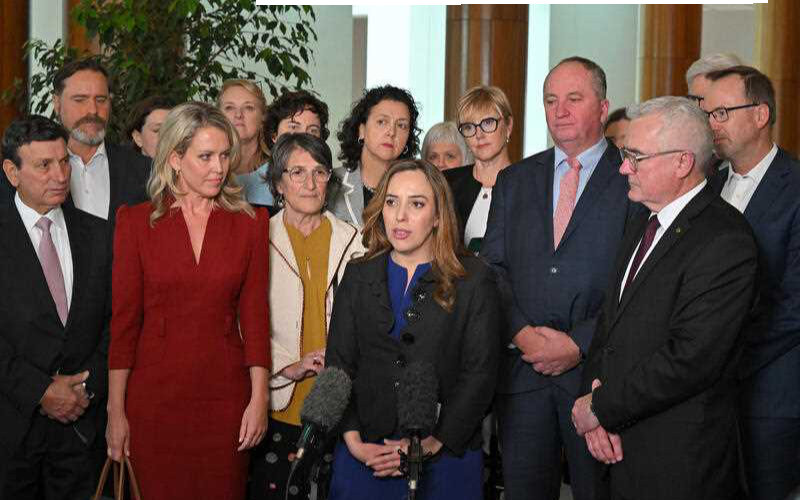“Enough is enough” Prime Minister Albanese said of WikiLeaks publisher Julian Assange’s situation. Australians might have thought that meant swift intervention by his government, but Rex Patrick and Philip Dorling reveal the true meaning; jail.
The Albanese Government won’t press the US Government to drop the prosecution of Julian Assange.
New information extracted from the Attorney-General under Freedom of Information (FOI) laws make it clear Assange will remain in Belmarsh prison until he is extradited to the US, for him then to sit in a US maximum-security prison for the years it will take for his matter to be dealt with by the US Court, and then and only then (assuming he’s convicted) will the Government intervene to have him transferred to an Australian jail.
AG Dreyfus not Interested
Attorney-General Mark Dreyfus likes to talk about media freedom, but he’s very quiet on the most notable prosecution of an award-winning Australian journalist.
Perhaps the first glaring thing that comes from the latest FOI disclosure on the US espionage prosecution of Julian Assange is just how little Australia’s first law officer has been engaged with the matter.
A request for all briefings and submissions provided to Dreyfus by his department between June 2022 and September 2023 netted just five documents; only one ministerial submission, two parliamentary question time briefs, one “hot topic” brief, and another set of talking points. Five documents across fifteen months.
Assange’s case raises fundamental questions relating to media freedom and journalistic practice worldwide.
The US prosecution of Assange, an Australian citizen, has attracted widespread international criticism. Amnesty International, Human Rights Watch, Reporters without Borders, Australia’s Media, Arts and Entertainment Alliance, numerous other human rights and media freedom organisations, and a wide spectrum of Australian Parliamentarians have called for the espionage charges against Assange to be dropped.
But Australia’s Attorney-General has shown little interest in doing anything.
No diplomacy either
The released Attorney-General’s Department papers make no substantive reference to any quiet diplomacy to being undertaken by the Australian Government to secure an end to the US prosecution and Assange’s release.
Prime Minister Albanese’s platitudes that the case has gone on too long and should be brought to a close are shown to be just that, platitudes.
One of the Government’s standard talking points in Dreyfus’ briefings is to say that “not all foreign affairs are best conducted with a loud hailer”. In this case, however, the documents provide no evidence that any quiet conversations have been had, either.
Other FOI applications directed toward the Australia’s Embassy in the US have revealed no evidence of significant diplomatic activity, indeed quite the contrary. The Assange case has been carefully corralled off from the bilateral diplomatic agenda.
Rot in jails
What the Attorney-General’s briefings reveal is a firmly established position not to engage on the Assange case until after he has been extradited to the United States, put to trial, convicted, sentenced and has exhausted all appeal rights. Only then does the Australian Government think it might play a role. Only then will the Attorney-General consider the possibility that Assange might be transferred to serve a sentence of imprisonment in Australia.
This is spelt out in a departmental briefing note by Dreyfus within a week of being appointed Attorney-General in June 2022.
If surrendered, convicted and sentenced in the US, Assange could apply under the ITP [International Transfer of Prisoners] scheme to serve his sentence in Australia.

Attorney General’s office briefing note
Despite 15 months of lobbying by Australian MPs and Senators across the political spectrum – Labor, Liberal. National, Greens, Teals and other independents – the released briefings show the Government is engaged in no substantive action on the Assange case and still only sees itself playing a role after Assange has, hypothetically, been convicted and sentenced and has exhausted his appeal rights.
If asked about an international prisoner transfer, the line agreed by the Attorney-General is a blunt “I will not comment on hypothetical scenarios.”
In the course of extradition proceedings in the United Kingdom, the US Government has provided a general assurance that it would be open to Assange being transferred to Australia to serve any custodial sentence imposed on him if he is convicted.
However, there’s no guarantee as to the timeframe within which any international prisoner transfer application made by Assange would be processed and agreed by the US Government. It’s not known what conditions would be imposed.
It’s now clear that Dreyfus won’t give any in-principal decision or commitment in advance of a prisoner transfer request transmitted by the US Government.
And that could well be many years away if it ever comes.
How “enough is enough” will play out
So how will all this play out?
Assange is waiting on a British High Court decision on his appeal against his extradition to the United States. That decision may come soon. If his appeal fails, he’s pretty well at the end of his legal options in the United Kingdom.
If extradited to the US, Assange will face one federal charge of conspiracy to commit computer intrusion for allegedly trying to help crack a password to a US Government computer, 17 counts of violating the US Espionage Act and another charge of alleged incitement of computer hacking. If convicted, Assange faces a cumulative total of up to 175 years’ imprisonment.
An espionage trial in the United States will be protracted and any conviction subject to appeal, potentially all the way to the US Supreme Court, given likely arguments relating to the free speech protections of the 1st Amendment to the US Constitution.
All the while, consistent with US practice in espionage cases, Assange will most likely be incarcerated in a maximum-security federal prison, probably in solitary confinement and circumstances harsher than his current imprisonment in His Majesty’s Prison Belmarsh. The mental health and safety risks have already been made clear in the extradition proceedings in the United Kingdom.
And even after any conviction and sentence, Dreyfus makes no promises; as his department tells him, that “may raise expectations that can’t be met later.”
Arguably, by the time this process plays itself out, the odds are that Dreyfus, now aged 67 years, will no longer be Attorney-General. Anthony Albanese may no longer be Prime Minister. The political wheel in Australia may well turn faster than the wheels of justice in Alexandria, Virginia, or Washington, DC.
Government hypocrisy
Of course, the Government’s frequent refrain has been that “Australia is not a party to Mr Assange’s case, nor can the Australian Government intervene in the legal matters of another country.”
Yet those boiler-plate talking points didn’t stop the Government from energetic and persistent representations that eventually secured the release of Australian citizen and journalist Cheng Lei, charged with a bogus espionage offence, from the clutches of the legal system of the People’s Republic of China.
Curiously, Australia’s extremely close ties with the United States, now reinforced by the AUKUS partnership, appear to inhibit rather than facilitate action on the Assange case. The Australian side won’t move beyond platitudes, and the US side, most recently through Secretary of State Antony Blinken, has publicly refused to consider changing course, even though recent history shows the Biden Administration is quite prepared to intervene in legal proceedings and indeed release convicted felons such as the Russian arms trafficker Victor Bout and several Iranian sanctions violators, when it suits US national interests.
Captured by the security mandarins
Neither Albanese nor Dreyfus will act. AUKUS has shown they are captured by their national security bureaucratic advisers.
The intelligence and national security community sees Assange not as a journalist or publisher, but as a menace better kept locked away in the British and American prison systems, and are advising accordingly. They’re only interested in him eventually coming back to Australia if he’s in shackles. Dreyfus has never questioned this. The same goes for Prime Minister Albanese.
Media freedom is not on the AUKUS agenda.
The full FOI release is below.
 Loading...
Loading...
Mark Dreyfus, whistleblowers and the non-existent circumstances


